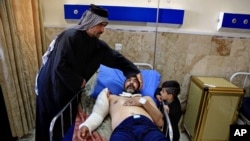Suicide car bomb attacks on Iraqi security forces in the western Baghdad outskirts of Abu Ghraib that killed eight Monday are a sign of Islamic State (IS) desperation, U.S. Ambassador to Iraq Stuart E. Jones told VOA Alhurra-Iraq. The blasts were targeting a security checkpoint.
“We’re going continue to see Daesh make desperate attacks like they did today in Abu Ghraib, and that’s serious. They have to be addressed,” Jones said, using a derogatory name for IS.
The blasts followed a suicide bomb blast earlier in the day at a funeral north of the capital that killed at least 24 people. IS has claimed responsibility for the attack in Muqdadiyah, about 90 kilometers north of Baghdad.
But overall IS is losing, Jones said. “Daesh has not been able to launch a significant attack against the Iraqi security forces, and everywhere the Iraqi security forces confront Daesh, Daesh is now being pushed back. We saw that up in Ramadi. We’ve seen it up in the north.”
Assault on Mosul
The Pentagon says an assault on Mosul in Iraq is not something that will happen “in the deep, deep future” after the capture of Shaddadi in northeastern Syria last week.
Shaddadi was "a critical node for IS training and logistics, as well as for its oil enterprise," U.S. Secretary of Defense Ashton Carter told reporters Monday.
"By encircling and taking this town, we are also working to sever the last major artery between Raqqa and Mosul, an operation critical to dissecting IS's parent tumor into two parts in Iraq and Syria.”
Carter added that the U.S. and coalition partners are using cyber tools to disrupt IS's ability to operate on the virtual battlefield.
He said Iraqi soldiers will take the lead in Mosul, which will be similar to the reclamation of Ramadi in December, but larger.
Jones said U.S. and coalition partners “are very proud” to be supporting the Iraqi security forces with airstrikes, weapons and intelligence gathering. He added, “We’ve now trained over 20,000 Iraqi security force members and we’re seeing the difference on the ground… Daesh is not really able to stand up and fight against the Iraqi security forces anymore.”
Lessons learned in Ramadi
Joint Chiefs of Staff Gen. Joseph Dunford acknowledged that after Ramadi, the U.S.-led coalition will be making some changes. "There's a couple of things we want to do. One is we want to position ourselves to most effectively support combined arms for the Iraqis as they conduct operations, and the second piece is we want to make sure that we have uninterrupted flow of logistic support," he said.
Jones admitted that the struggle against IS has a long way to go and that the campaign will be a difficult one. As in Ramadi, he said the help of local of fighters will be critical. In Ramadi, they helped the Iraqi forces get through the city, a dangerous mission that incurred a lot of casualties.
“I don’t think that any of these campaigns are going to be easy, but we are seeing that Daesh is weaker and weaker with each step,” Jones said.
Food aid from U.S.
The United States will give Iraq another $20 million in aid, intended for supplying food rations for vulnerable Iraqi families.
U.S. Ambassador to Iraq Stuart Jones said Monday that, with the additional funding, the U.S. government is helping the United Nations World Food Program reach 1.5 million displaced and conflict-affected Iraqis throughout the country.
The family baskets include food to be cooked — such as flour, rice, oil, and dry peas and beans — while the ready-to-eat baskets are for displaced families who do not have access to kitchens. They include canned meat, canned peas and beans, dates and biscuits.
Since 2014, the United States has provided nearly $624 million in humanitarian assistance for the Iraqi people.





